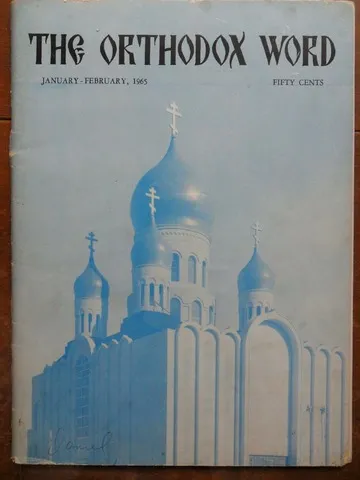From The Orthodox Word #1

And they thought it was bad then… ! From the blog of Reader Timothy Newsletter From a True Orthodox Christian
Never has the Church of Christ been so encompassed by enemies as today: in Eastern Europe, subject to the Communist yoke, whose aim is the liquidation of the Church; in the free world, enticed by the false promises of ecumenism, holding out to unwary Orthodox the bait of a new ‘Union’. This is truly the darkest hour in the history of the Orthodox Church – From the Orthodox Word #1
Wow… Read the whole article here: https://timbosays.substack.com/p/from-the-orthodox-word-1





What can you tell us on why the Filioque is a doctrinal heresy?
Dear Scott,
The Filioque is a compound word being made up of the Latin words Filius (Son) and que (and). And is a heretical addition to the Symbol of Faith solidified at the First and Second Ecumenical Council.
First of all, it is anti-scriptural.
“But when the Comforter is come, whom I will send unto you from the Father, even the Spirit of truth, which proceedeth from the Father, he shall testify of me.” (John 15:26) “From the Father”… and “which proceedeth from the Father”. Very clear in Holy Scripture.
The Son and the Holy Spirit have their eternal procession from the Father. “Ἐκπόρευσις” in the Creed’s original Greek is clearly not sending out as is confusing in Latin but rather coming from the source.
The idea of the Filioque is totally unacceptable by the Creed decided on by the First and Second Ecumenical Council.
When on the 15 of July, 1054 Cardinal Humbert of Silva Candida placed a written statement on the Holy Table of Hagia Sophia anathematizing the Orthodox and stating that the Orthodox were heretics because they refused to accept the innovation against the Sacred Scripture and the Council that the “Holy Spirit also proceeded from the Son”! The Latins accused (totally in denial of all written theology and history) the Orthodox of having cut out the Filioque from the Nicene Creed. According to the Third Ecumenical Council (Each Ecumenical Council began by approving the decisions of the former one), We must not add or subtract not even one word from the accepted Creed.
In this case, two words were added by the Latins that changed the very essence of the theology and order of the Holy Trinity.
Since we cannot understand the mystery of the Holy Trinity but only its dogma, then we must follow only the words of the Scripture that we mentioned before and the decision of the First and Second Ecumenical Council. To think that more revelation concerning the Holy Trinity has come later is the basis of heretical teaching.
The Unbegottness of the Father, the begottness of the Son, and the proceeding of the Holy Spirit from the Father alone are the main distinctions of the three Persons of the Holy Trinity revealed to us.
The Holy Spirit proceeds from the Father and is sent out by the Son. Proceeding from and being sent out by are two very different things that the Latins confused into one. This sending out of the Holy Spirit and appearance to man through the Son in time has nothing to do with the eternal nature and procession of the Holy Spirit from the Father.
Also, according to the Nicene Creed, Jesus Christ was incarnate of the Holy Spirit and the Virgin Mary, so how can the Holy Spirit be part of the making of the Son and also proceed from Him as if the Son is in control of the Holy Spirit? He controlled the Holy Spirit to create Himself?
The Filioque was an attempt, by the West, to clarify things at that time (I don’t recall the argument), but in effect created a theological anomaly which eventually caused bigger riffs between West and East.
The Nicene Creed is the blueprint of the Christian faith; anything that disagrees with it is heretical.